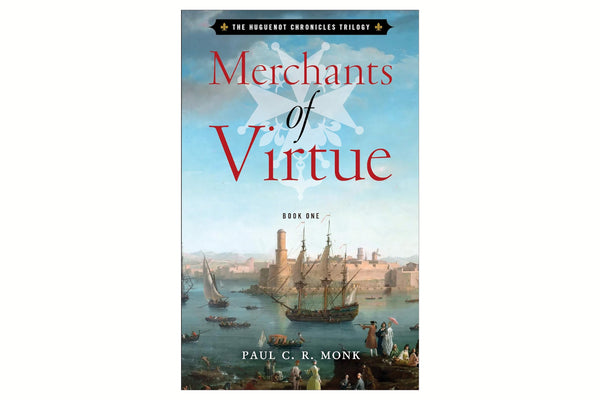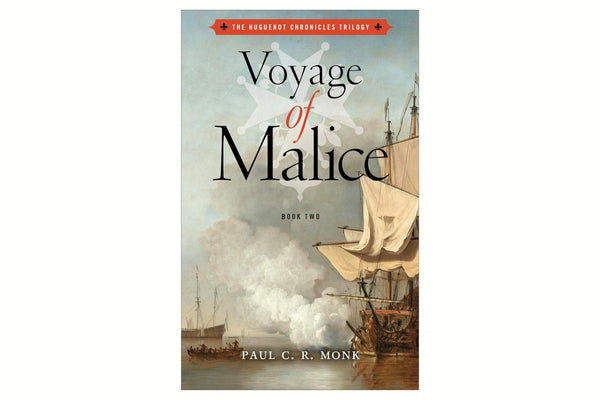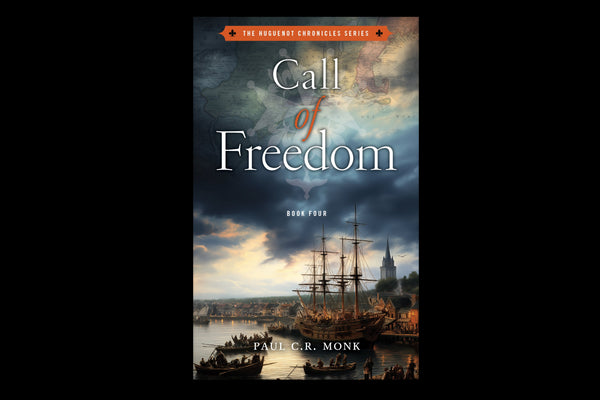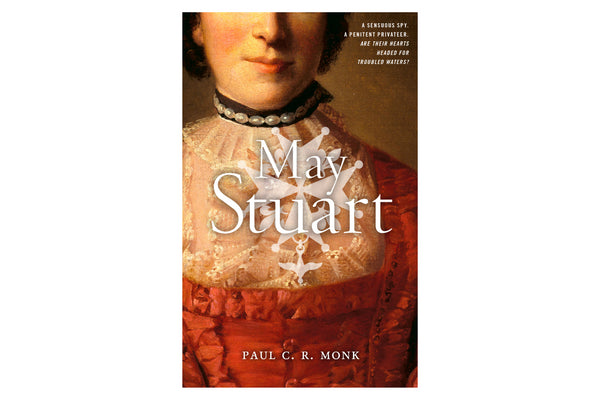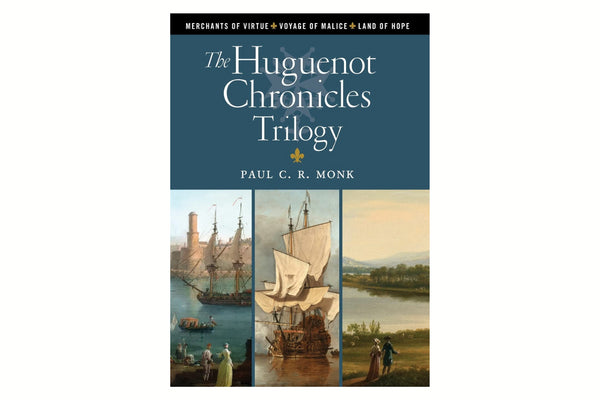Chapter 1 of May Stuart
On the day when news of the English declaration of war against France reached Port-de-Paix, Captain Joseph Reners had already set sail to Charles Town.
Standing pensively on the quarterdeck that night, he lowered the flame of his deck lantern so his eyes could become accustomed to the starlight. Whatever anyone might say, he thought to himself, oblivious to the world over the horizon, turning forty was a landmark in a man’s life that should not be contemplated alone, so he gazed up at the stars. Both his father and grandfather had drawn their last breath at sixty, which to Joseph meant that he might well be two-thirds through his own life already.
Perhaps it was time to change course, he thought, picking out his old companion, the North Star, as a warm Caribbean wind whistled through the creaking rigging. Anyway, he had quite had his fill of roving from port to port. It was not so much the ports he was jaded by, more the bits in-between, the seafaring bits which were either extremely dangerous or downright tedious. But on this voyage, he had a very important passenger, and he squeezed his hands silently together in anticipation of a coquetry, or even a pursuit of true love, if that was still possible at his time of life.
A strong leader and proud of his person, he had nonetheless made a success of his twenty years of roaming. He had recently purchased a larger vessel to ferry goods and chattel, and he had amassed a fair fortune. His line of business was not likely to flounder either. In fact, he had a notion that it was just the beginning.
But Captain Reners, during those bits between ports, more and more often got to thinking he had no family, no wife, no children. Perhaps it was time to settle down, make a home some place. He could hire a good captain to do the navigating, and besides, what with the hostilities in Europe, he sensed things were about to turn even choppier at sea.
It was two hours after sundown, and a near full moon now shimmered over a slight sea.
Then he heard it.
The creak of a cabin window.
He stealthily stepped to the starboard bulwark of his new merchant ship and leaned over. ‘Good Lord,’ he murmured, ‘she’s doing it again!’
He was not referring to his seventy-ton vessel that coasted at an even keel through the Windward Passage into the waters of the Bahamas. She was quite perfect and a beauty to behold—a far cry from his old pink—more navigable on long voyages, and she coursed through the wavelets like a bolt. No, he was referring to Madame Stuart, his very important passenger whose presence kept him well-groomed and smelling of lavender water.
Admittedly, he had been looking forward to his usual stopover at Nassau, until the governor of Saint-Domingue asked him to take aboard his widowed niece. It would be untoward to carry a lady of quality to such a riotous place. He would have to put in elsewhere to water, which was a pity, because of all the lovely ladies he admired in all his ports of call, Betty was the loveliest of them all, and Betty was in Nassau. Soft and reassuring was Betty, motherly almost, and she had the softest bosom a weary gentleman traveller could lay his head upon. The perfect companion to help round the cape of your fortieth birthday.
But this youngish widow would do fine, he thought to himself rascally. He had already noted the worldliness of her glance, and he liked strong-willed women, ones capable of handling themselves.
He looked down the side of the hull again as La Bella Fortuna cut through the water. ‘How strange,’ he said to himself, as below him another dress was thrown out of the cabin window.
He had been considering how it would improve his status in higher circles to marry a governor’s widowed niece . . . But was she, though? Was she really who she said she was? He was beginning to wonder . . .
‘Cap’n, Sir,’ said Mattis, a stocky matelot with a large, bullish head, standing at the foot of the poop-deck steps, ‘I managed to pike this . . .’ Reners twisted his torso to see the sailor holding up a beautiful crimson silk dress that gleamed in the night, the kind of dress Joseph had seen ladies wear in certain haunts of pleasure. He could barely hide his surprise. Who was Madame Stuart?
*
May Stuart had come a long way since leaving London all those years ago.
Sitting in the relatively comfortable cabin reserved for very important persons, she pulled out another wildly expensive robe from the trunk she had placed beneath the glazed window. She held up the crimson garment of fine silk by the shoulders. ‘Pity,’ she said to herself, ‘shan’t be needing you anymore!’ Then she pushed open the window and promptly bundled the robe through the dark hole into the star-speckled night.
Pulling out another alluring dress, she inwardly smiled at how easily she had the captain already eating out of the palm of her hand. She well knew the bovine-eyed look of a besotted middle-aged man. Yet, compared to the robe she was now holding up, she was very conservatively clad in a puritan black dress buttoned to the neck, with subtle white frills at the collar and sleeves. It contrasted forbiddingly with her copper blond hair and smooth, light skin. And her ruby-red lips stood out like an exquisite poppy in a field of barley. She did not need a dress to make her beautiful, she knew, but it was always reassuring when her beauty was confirmed. ‘You can go too!’ she said, and threw the robe she was holding out into the sparkling night.
She was relinquishing her costumes of seduction. And yet, as she swayed gently in time with the pitch of the ship, she had never felt more in command of her life.
The captain would be a fine catch for sure, she thought, if his ship was anything to go by. But May had already told herself she did not need a man to tell her what to do. She had had plenty of those already; none of them had been any good—except for her late husband, perhaps. But there again, she had been blinded by love, and thinking about it with hindsight, he had been no good either. He was the one who had lured her to the thrill of the voyage and the prospect of fortune, only to leave her caught in a never-ending cycle to make ends meet. From the French port of Saint Pierre to Spanish Havana, she had exploited men’s pillow talk and lifted their wallets, laced their drinks, and searched their pockets.
She pulled out another low-cut dress and threw it out. She had never intended to be a sinner, though. At least, not until she realised she was in possession of a formidable weapon. Some women were blessed with fabulous wealth from birth, others with a strong sense of motherhood; others still received the gift of caring, and some got nothing but ailments. As for May, the good Lord had provided her with beguiling beauty and irresistible sex appeal. Was it not her God-given right to exploit it for the sake of self-preservation? At least, it was the only way she had been able to navigate these shark-infested waters of man’s new world.
‘A new life. A new me,’ she said to the glorious green dress she was holding up. Then she threw it out through the window.
At thirty-two, May felt like she had lived more lives than a bodega cat. But she had left Havana for good this time, and now she intended to be her true self. She had her little treasure and planned to invest in some land.
Sitting back in her chair, May imagined her new home, and what it would be like to live in four seasons again in the north. She pictured a pretty stone house with a roaring chimney in winter, a flowered garden, outhouses for storage of whatever she decided to invest in, a stable for a wagon and strong workhorses, a fine mare, and an upholstered French carriage with glass windows. But she could not yet picture a man. She would need one, of course, but what he would look like, she knew not. She only knew he would have to be dependable, as clever with his head as with his hands, and not lack etiquette. She would not fall for a fat-fingered merchant or a grubby-nailed tradesman, oh no: she wanted nothing less than a fine gentleman to be her partner through life. And she would spend the rest of it trying to be righteous and mending her soul; that is what she planned to do.
She would start by removing anything that reminded her of her past lives. But throwing away beautiful dresses was not as easy as she thought, and she had been obliged to stop the previous night. She could have sold them, or even given them away, but that would have been betraying her true self, not to mention the dresses. They had been like a second skin to her and had served her well. They had raised her profile and given her a certain standing. But if she was to seek redemption, she would have to part with them, to relegate them to the vault of her memory like past lovers.
She took another sip of rum, braced herself, and then threw out the offending dress.
After leaving Havana in her usual, more . . . uplifting attire, she had changed into something more appropriate once in Port-de-Paix. Here, the governor, in exchange for her intelligence services, had assured her of a passage aboard the merchantman headed north to Charles Town, Carolina, the new port town where she returned twice yearly.
She picked up the last robe but one left in the trunk, her second favourite. This time, after flinging it out, she poked her head through the window and watched the shimmering saffron dress sail away into the night like a phantom of her past. It suddenly occurred to her that someone could have spotted it as it momentarily floated up with the wind in the direction of the ship. But then it did a pirouette and tumbled blindly into the dark sea. Besides, who would be looking out into the night at this late hour? ‘There,’ she said, sitting back down in the armchair before her trunk, ‘all gone, all but one, just in case . . .’ and she gave a deep sigh.








